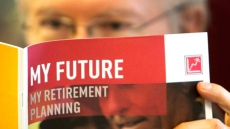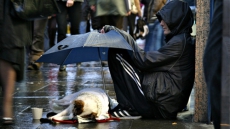WASHINGTON — U.S. President Donald Trump's new top economic adviser's views on trade will likely thrill Justin Trudeau — so long as he's willing to overlook some of his other views: specifically, those involving the prime minister himself.
A former Wall Street analyst and current cable-TV personality, Larry Kudlow was named Wednesday as the new director of the White House National Economic Council.
He's a blunt-talking booster of trade with Canada, giving the northern neighbour a high-profile new advocate at a sensitive moment in Canada-U.S. relations. His mince-no-words, take-no-prisoners punditry indicates that he holds Canada-loving, NAFTA-supporting, tariff-opposing views.
His view of the prime minister? That's another story.
''Unfortunately we're going after a major NAFTA ally. Perhaps America's greatest ally. Namely, Canada,'' Kudlow said on CNBC, discussing possible tariffs two weeks ago.

''Even with this left-wing crazy guy Trudeau ... they're still our pals. Why are we going after them?''
Trump had said he wanted someone whose views would clash with his own nationalist impulses and that's precisely what he's getting: in his commentary, Kudlow has been scathingly critical of protectionist moves like steel tariffs.
Key debates over NAFTA are likely to unfold over the coming weeks as the White House makes a long-shot effort to try wrapping up a deal by spring, and getting it ratified by the end of the year.
Kudlow's Twitter feed is filled with pro-trade tweets. In one recent radio appearance Kudlow began by criticizing the president's steel and aluminum tariffs, then pivoted into a prediction of economic disaster should Trump cancel NAFTA.
"My greatest fear ... is not the steel thing but that we will walk away from NAFTA — which I think would be a calamitously bad decision," Kudlow told "The John Batchelor Show" a few days ago.
"It would turn business against the president ... and would, frankly, blow up the whole stock market."

Kudlow replaces the like-minded Gary Cohn as head of the council; like his predecessor, he is likely to clash with the more protectionist wing of the White House, embodied by trade adviser Peter Navarro, and the president himself.
Previews of the battles ahead came in that radio interview.
Kudlow called U.S. trade czar Robert Lighthizer the "master" of trade-penalty laws — laws Kudlow said make no sense. He also pointed out that the person leading the steel-tariff file for Trump, Wilbur Ross, owned steel companies.
He said the U.S. has all the steel it needs, and shouldn't be punishing its entire economy by setting tariffs to protect a tiny fraction of businesses.
''These (steel producers) want protection, they're not competitive, they're bloated companies,'' Kudlow.
Ross has argued that the tariffs are legitimate under national-security law. A 1962 U.S. trade law allows emergency measures under a broad definition of national security, which could be interpreted to mean the country's economic interest.
Kudlow ridiculed that too.
''Are you going to tell me that if we went into a real war — like, a major war — and we needed more steel, that Canada wouldn't give us steel? Are you seriously telling me that?'' Kudlow said.

''I mean, that's how silly this is.''
Trump spokeswoman Sarah Sanders said Kudlow was offered the job, and accepted. It was actually Kudlow who announced it first in media interviews. Kudlow said he was discussing the job by phone with Trump, and, it just so happened, the president was watching TV and saw Kudlow's face pictured.
Kudlow told the Politico site the president said: ''You're looking handsome, Larry.''
Friends and colleagues say Kudlow, 70, possesses two critical attributes prized by the president: He is a straight-talking debater and is resolutely loyal.
In 1987, Kudlow moved to Wall Street and, though he never completed a master's program in economics and policy at Princeton University, served as chief economist at Bear Stearns. He left that position in the early 1990s to treat an addiction to alcohol and drugs, after which Kudlow worked at Laffer's research and consulting firm.
Kudlow soon settled comfortably into the world of political and economic punditry, working at the conservative National Review magazine and ultimately becoming a host of CNBC shows beginning in 2001. He has remained a contributor to CNBC and a colleague and friend for many at the network.
He has his critics.

The book ''Superforecasting,'' which analyzes the attributes of what makes someone good at predicting upcoming events, uses Kudlow's wild misses in the leadup to the 2008 financial crisis as a cautionary example of what not to do.
One of the book's core arguments is to fight back against your own biases when making a prediction, to seek contrasting views, and to factor everything in. Instead, it said, Kudlow's unflappable ideological faith in earlier tax cuts convinced him there would be no big recession.
''As the months passed, the economy weakened and worries grew, but Kudlow did not budge. There is no recession and there will be no recession, he insisted,'' says the book, by Canadian Philip Tetlock and Dan Gardner.
''Through the spring and into summer, the economy worsened but Kudlow denied it. 'We are in a mental recession, not an actual recession,' he wrote, a theme he kept repeating until Sept. 15, when Lehman Brothers filed for bankruptcy, Wall Street was thrown into chaos, the global financial system froze, and people the world over felt like passengers in a plunging jet, eyes wide, fingers digging into armrests.''





